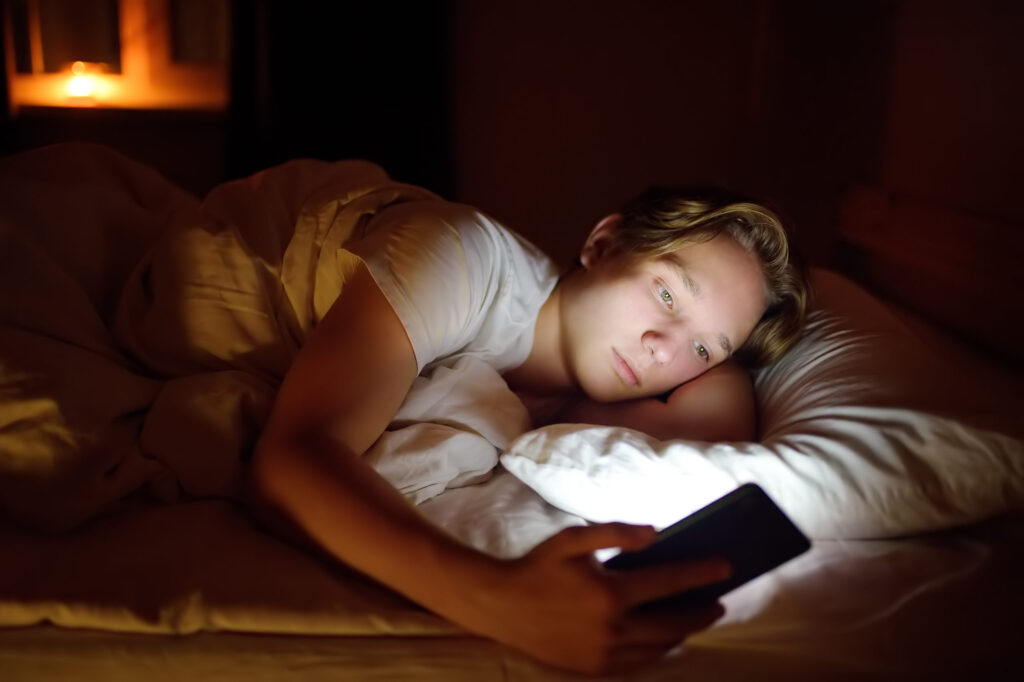What is Technology Addiction?

Technology addiction is extremely prevalent among teenagers. The technology addiction teens deal with today has only increased in prevalence in the last several years. Around half of teens self-report being addicted to their smartphones, and some studies even show that teens spend around nine hours online per day. With stats like that, it’s easy to see that the answer to the question, “Is technology addictive for teenagers?” is a resounding “Yes.”
Technology addiction in youth is worth knowing about and understanding, whether you’re a parent, a caregiver, or a teenager yourself. If you’re seeking help for teenagers with screen addiction, we have the information you need.
Signs and Symptoms of Technology Addiction
Loss of Self-Control with Technological Devices
Are teens too reliant on technology? The technology addiction teens often deal with seems to indicate that the answer is yes. The overreliance on technology that many teens display often indicates loss of self-control with digital devices like phones, tablets, and laptops.
These devices offer instant gratification and entertainment for teens, which can be hard to resist. With infinitely novel content available to teens online, breaking away from screens can feel nearly impossible. As a result, many teenagers feel compelled to look at their phones whenever they feel the slightest twinge of boredom or negative emotion.
Neglecting Responsibilities
The technology addiction teens experience often manifest itself in the form of neglecting important responsibilities. You might notice your teen forgetting about homework or their grades slipping due to compulsive use of tech. Furthermore, if your teen works, they might be more prone to showing up late or forgetting their schedule because of digital distractions.
Social Isolation from Loved Ones
Compulsive use of technology can quickly shut a teen out from opportunities to connect in the real world. You may notice your teen spending less time with family and friends if technology addiction worsens. One of the most common signs of screen addiction is a lack of interest in real-world relationships in favor of the parasocial “connection” offered by social media and the internet.
Physical Pain like Back Pain or Eye Strain
While often overlooked, screen addiction can often cause or worsen physical symptoms like eye strain or back pain. Sitting and staring at a screen for excessive periods of tim isn’t healthy for a teen’s body or mind, and it can cause posture problems, headaches, insomnia, and more.
How Does Technology Addiction Affect the Brain?

Research suggests that tech addiction can significantly alter a teen’s brain.
There are several ways that we see the neurological effects of technology addiction on teens:
- Teens with technology addiction often develop coexisting unhealthy behaviors. These bad habits may include healthy eating, rarely exercising, and poor personal hygiene.
- Teens with technology addiction often have shorter attention spans and have trouble focusing on tasks for sustained periods of time. Reading a textbook, writing an essay, or carrying on a conversation without checking phone notifications can feel next to impossible due to the constant pull of technology.
- Teens with technology addiction often experience increased anxiety and depression. There are several tech-related factors that may contribute to these mental health issues, including use of social media, lack of sunlight and time outdoors, and reduced connection with others in the real world.
Key Statistics of Technology Addiction
Below are some of the most shocking stats about technology addiction:
- The average person checks their phone nearly 100 times per day.
- 12% of teenage boys are addicted to video games.
- Teens spend an average of 7-9 hours on screens each day.
- The average gamer plays for at least eight hours per week.
- The young adult users of Facebook and Instagram have significantly higher rates of anxiety and depression.
Tips for Limiting Teen’s Technology Intake
We offer support for families and teens to help you find the resources you need to conquer technology addiction. Below are some essential tips to follow to limit your teen’s technology intake and promote healthy habits.
Limits on Screen Time
Setting limits on daily screen time is key for fostering a healthy relationship with technology. You can use an app like Apple’s Screen Time, Disney Circle, or Bark to enforce time limits, content restrictions, and mandatory downtimes on your teen’s devices.
Communication with Teens
One of the most important steps in your teen’s screen addiction recovery process is open communication with their parents. As a parent, you can provide invaluable help and support to your teen as they navigate their recovery journey. Try to initiate open conversations with your teens about their tech use and be an active participant in their recovery.
Reward Positive Behavior
Another simple way to help your teen break free from tech addiction is providing incentives for positive off-screen habits. Your teenager has other interests, motivations, and desires other than time on a screen; find out what those key motivators are and use them to help your teen break the habit of compulsive technology use.
Encourage Alternative Hobbies
Finally, it’s crucial that you encourage your teen to nurture their skills, talents, and interests that don’t involve screens. For example, if your teenager is drawn to songwriting and music production, consider offering to pay for guitar lessons or helping them find their first guitar or keyboard.
Final Thoughts on Technology Addiction for Teens
Technology addiction is a serious issue that affects countless teenagers. However, there’s hope for any teen stuck in the grip of tech addiction. If you’re seeking help for a screen-addicted teen, we have the resources you need. Contact us today to find out how we can support your family on the screen addiction recovery journey.
































































